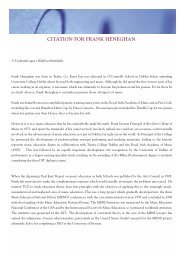TWICE THE SIZE - DIT Update - Dublin Institute of Technology
TWICE THE SIZE - DIT Update - Dublin Institute of Technology
TWICE THE SIZE - DIT Update - Dublin Institute of Technology
You also want an ePaper? Increase the reach of your titles
YUMPU automatically turns print PDFs into web optimized ePapers that Google loves.
estructuring. By 2020, however, burgeoning growth had placed enormous strains on local<br />
environments and social fabric in urban Asia. The physical infrastructure <strong>of</strong> many cities had not<br />
been able to keep pace with the transformation, and serious problems <strong>of</strong> air and water quality<br />
emerged. Demand for energy, moreover, was outrunning the capacity for emerging nations to<br />
sustain growth.<br />
One <strong>of</strong> the unexpected by-products <strong>of</strong> the formation <strong>of</strong> the GEA, with its emphasis on<br />
technocratic efficiency, has been the effect on national governments. An emerging consensus in<br />
this “Equality” world about the necessity for sustainable development has resulted in a new<br />
understanding about the role <strong>of</strong> the government. The conventional understanding, that<br />
governments are merely required to provide security and the legal framework fro markets to<br />
operate successfully, was seen to be too simplistic. Also rejected were the old discredited<br />
“dirigiste” attempts to direct economic growth through centralised command and control. What<br />
has emerged, instead, is a fresh understanding <strong>of</strong> how governments interact with markets in<br />
order to improve economic performance by providing a clear framework supporting necessary<br />
public goods.<br />
Europe<br />
For Europe in 2030, this is a world <strong>of</strong> “shared responsibilities”, where unparalleled economic<br />
growth is enjoyed as a result <strong>of</strong> legal certainty and market transparency. A sustainable and high<br />
quality <strong>of</strong> life is enjoyed by all, and the integration <strong>of</strong> Europe has dramatically altered the<br />
global political and economic landscape.<br />
While power remained mainly in the hands <strong>of</strong> nation states following the enlargement <strong>of</strong> 2004,<br />
by 2015 the EU government had taken great strides towards replacing national governments as<br />
the overarching authority in most realms <strong>of</strong> society and the economy – <strong>of</strong>ten by default or by<br />
disguise. National governments made few attempts to undermine centralised decisions<br />
thereafter, and the majority <strong>of</strong> citizens see themselves as increasingly European.<br />
Member states are continually learning from each other, which facilitates the convergence <strong>of</strong><br />
ideals. Concepts such as sustainable development, corporate social responsibility, and active<br />
citizenship, have gradually crept into all policy agendas within the EU. European leadership, in<br />
fact, is seen as important for achieving broad international co-operation in areas such as trade<br />
and sustainable development.<br />
During the past fifteen years, since about 2015, Europe has undergone a pr<strong>of</strong>ound change. In a<br />
favourable global economic climate, it has found a way <strong>of</strong> reconciling its ideals <strong>of</strong> solidarity and<br />
respect for the individual with technological innovation and the pursuit <strong>of</strong> economic efficiency.<br />
At the root <strong>of</strong> this change undoubtedly lies the transformation <strong>of</strong> the public sector, which, after<br />
a decade <strong>of</strong> ambitious reform, has become a facilitator or partner in society. Government<br />
agencies, at all levels, aim to help individuals, firms and civic associations assume their share <strong>of</strong><br />
responsibility for the life <strong>of</strong> the community. On top <strong>of</strong> this, due to extensive debate and<br />
reform, Europeans have embraced integration. This has conferred greater legitimacy on the EU,<br />
111








